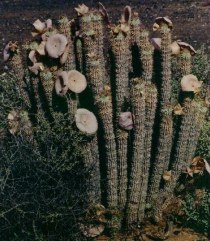Christmas Over-eating finally beaten
December 10, 2003
The Bushmen's secret that could knock the stuffing out of Christmas
By Ingrid Mansell
A BIOTECHNOLOGY company is threatening to use an ancient African Bushmen remedy to end an age-old Christmas tradition overeating.
Phytopharm, whose usual business is to derive drugs from plants, said that it was in advanced talks with four leading food companies to develop an appetite suppressant from extract of hoodia gordonii cactus. The Cambridge company hopes the result will be food that can help dieters to lose weight.
The snack would be an appetite suppressant based on a rare cactus known as Hoodia Gordonii, which is found in the Kalahari desert in southern Africa. For centuries the San people who live there have used the extract of the plant as an appetite suppressant.
The concept of a weight-loss snack-bar divided analyts in the City into two camps: those who viewed it as brilliant and those who thought it was a bit batty.
Richard Dixey, Phytopharm’s chief executive, said: The Hoodia cactus is the first appetite supressant ever discovered, so of course there are no appetite suppressing confectionary bars out there on the market yet. But that doesn’t make it a bizarre concept.
Although a snack containing Hoodia extracts could be sold to dieters to help prevent them from over-eating, Dr Dixey insisted that the extract would never be sold over the counter as an additive that could be sprinkled over, say, the Christmas turkey.

We could never sell it safely without adding calories, otherwise the potential for abuse by anorexics is too great, Dr Dixey said. It would always have to be sold as part of a nutrient replacement programme.
However, Phytopharm could potentially sell a drug containing the Hoodia gordonii cactus to obese people if it were prescribed by a doctor. That was the company’s original plan for the extract, but Phytopharm has been forced to consider other options since Pfizer, the world’s biggest pharmaceutical group, decided earlier this year not to develop the plant into an anti-obesity pill. That news wiped a third off Phytopharm’s market value, even though Dr Dixey insisted that he would develop the plant into a drug with another big pharmaceutical company.
Phytopharm has stepped up cultivation of the Hoodia in advance of what it hopes will be a breakthrough supply deal, with the likes of Nestlé or Kellogg’s, to develop the appetite-suppressing snack. Dr Dixey said that the company was growing hundreds of thousands of the plants and had collected 10 million seeds.
Unfortunately, for the greedy and gluttonous among us, nothing will save us from overindulging this Christmas, or even the next. Dr Dixey said that the hoodia gordonii appetite suppressant snack was still at least three years away from being available on the market.
News of Phytopharm’s plans for Hoodia come a week after GlaxoSmithKline, the UK’s biggest pharmaceuticals company, boasted that it had a potential chemical Atkins diet in its pipeline.
Tachi Yamada, GSK’s chairman of research and development, claimed that the experimental drug could enable dieters to eat however much sugar and carbohydrate they wanted, but still lose the same amount of weight as they would on the Atkins diet.
Mr Yamada said that the experimental drug designed to fight type 2 diabetes, could have the same effect by causing users to increase the quantity of glucose in their urine.
This means that dieters after eating hoodia gordonii appetite suppressant extract could potentially still eat their favourite foods, pop a pill after their meal and, as Mr Yamada euphemistically put it, wait for the glucose in their body to be diminished.